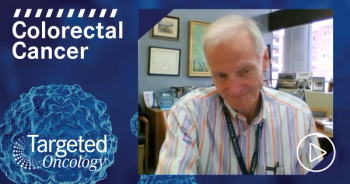
Case Description: Stage 4 Colorectal Adenocarcinoma
Paul Helft, MD:The case today is a 62-year-old man who presented with bloody stools and diarrhea to his primary care physician. He also complained of weight loss. His past medical history was significant only for diabetes, which was well-controlled on a single drug, metformin. He was referred for a colonoscopy and was found to have a mass approximately 6 cm proximal to the sigmoid colon. A biopsy of that mass showed moderately differentiated adenocarcinoma. Genetic testing discovered aKRASmutation in exon 3. He underwent imaging of the chest, abdomen, and pelvis and was found to have fairly widespread metastases in the liver, the lungs, and the lymph nodes. His diagnosis was therefore stage 4 colorectal cancer, and he was felt to be unresectable because of the widespread nature of his disease. After a discussion with him and his family about how to proceed, he elected to go forward with first-line therapy with FOLFIRI and bevacizumab. He was treated for several cycles and had some moderate nausea and vomiting, which was controlled with antinausea medications. He underwent follow-up imaging several months later and was found to have marked progression in all of his disease.
At the time of his next scan, he was found to have stable disease. Around 13 months after beginning therapy, the patient reported weight loss and fatigue. He underwent subsequent imaging, which found that he had progressive disease at that time. He continued to work and do light household chores, but he was too tired to exercise at that point. It was decided that he should go on to second-line therapy, and therapy with FOLFOX and bevacizumab was instituted. At the time of his follow-up CT scan, he was found to have a partial response in all of his lesions. He continued on that therapy for a while and was doing well.
So, this is a fairly typical patient who shows up with widespread metastatic colorectal cancer at the time of diagnosis. About one-quarter of all patients who are diagnosed with colorectal cancer are diagnosed at this stage, meaning that we’re finding patients far too late. He’s also quite typical in the sense that he’s relatively asymptomatic at the time of his diagnosis, even though he has widespread disease and was a candidate for all of the therapies that were reasonable for him clinicallywith the exception of anti-EGFR drugs, for which he was not eligible because of hisKRASmutation.
A very difficult question in a patient such as this is, what is the overall prognosis? Patients tend to ask about this on their first or second visit when they’re diagnosed with a disease such as metastatic colorectal cancer. And we obviously can’t offer them a definitive answer, but we know that over the past several years, the median survival times for such patients has increased quite a bit. And in the most recent clinical trials, we are seeing 2.5- and 3-yearand sometimes beyond that in certain subgroups of patients—median overall survival times.
February 2013
- A 62-year old man presented to his primary care physician complaining of weight loss and bloody stool.
- PMH includes type 2 diabetes, well controlled on metformin
- He was referred for a colonoscopy:
- Biopsy of a 6 cm. mass proximal to the sigmoid colon showed moderately differentiated adenocarcinoma
- Genetic testing was positive forKRASexon 3 mutation
- Imaging of the chest, abdomen, and pelvis showed metastases to inguinal nodes, diffuse hepatic lesions and a 4 cm. nodule in the left lung.
- Diagnosis: stage 4 colorectal adenocarcinoma, unresectable
- After discussion with the patient about his options for systemic therapy, he was started on FOLFIRI and bevacizumab. Moderate nausea and vomiting was managed with ondansetron.
- Follow-up imaging at 6 months showed marked regression in the primary tumor and lung lesion. Subsequent scans showed stable disease.
March 2014
- Thirteen months later, the patient reported weight loss and fatigue; he continued to do household chores but was too tired for exercise.
- CT scan showed increase in size of several of the hepatic lesions.
- Bevacizumab therapy was continued; the patient was also started on FOLFOX.
- Follow up CT showed significant shrinkage of hepatic metastases. The patient continued to tolerate therapy and appeared well.








































